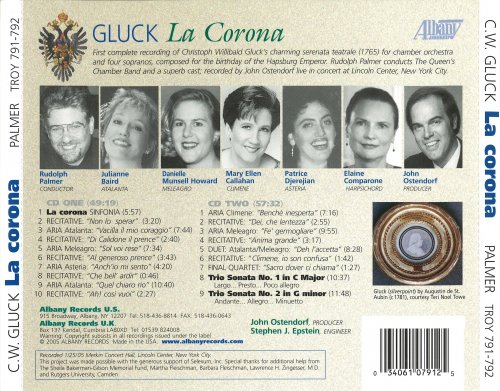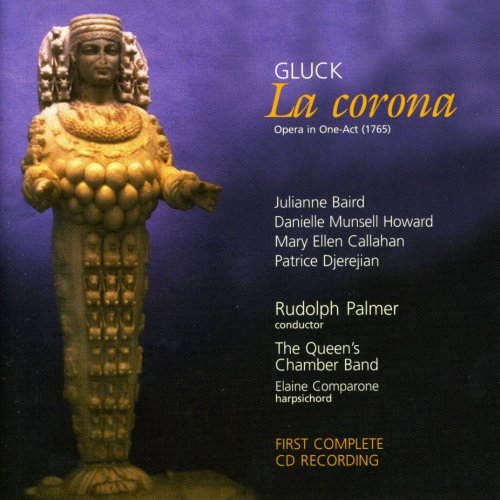
Rudolph Palmer - Gluck: La Corona (2005)
BAND/ARTIST: Rudolph Palmer
- Title: Gluck: La Corona
- Year Of Release: 2005
- Label: Albany Records U.S.
- Genre: Classical opera
- Quality: FLAC (image+.cue,log,scans)
- Total Time: 01:47:55
- Total Size: 499 MB
- WebSite: Album Preview
It may seem surprising that this is the first complete recording of Gluck's one-act opera (or, as he called it, serenata teatrale) La corona (The Crown) after more than 240 years. The work was never performed during Gluck's lifetime; written for the name day of Francis I, husband of Habsburg empress Maria Theresa, it was rendered irrelevant by the dedicatee's death in 1765. The listener will discover soon enough why no one has thought to revive the work since then. Gluck's operatic music is prized for its naturalness, but this little opera is anything but natural, and its text is neither tragic nor funny. La corona was written for the emperor's four daughters to perform, and the singers, although not the cast of characters, are all female -- three sopranos and one alto (not four sopranos, as is stated on the cover, in one of a group of editorial errors). The plot, loosely modeled on the Greek myth of Atalanta the huntress by librettist Pietro Metastasio on what was decidedly an off day, features sisters squabbling over who gets to hunt a wild boar and then kissing up to the handsome prince Meleagro who comes along to supervise things. Meleagro gets not the alto part but the highest soprano. Atalanta and Meleagro each land an arrow in the boar and flirt heavily over who should receive the laurel crown awarded for killing it. The good news is that the arias are written at a very high level of difficulty, with constant barrages of ornaments in punishingly high ranges, and the singers do impressively well at handling them. Virtuoso set pieces of this kind were exactly what Gluck pledged to eliminate from operas, but this work shows that he could write them when required. And the agile, fluttery voice of Julianne Baird as Atalanta, who gets the majority of the arias, seems to be exactly what Gluck had in mind when he composed the music. The other parts are scarcely easier, which speaks to the high musical level of the Habsburg court, and the rest of the singers stay on top of the music. Sound is a bit clunky in this recording, apparently cobbled together from two live performances, but it doesn't interfere with an appreciation of the singers' accomplishments. The Queen's Chamber Band under Rudolph Palmer has the kind of quiet confidence that's rare in American early music ensembles, both in the opera and in the two rarely heard trio sonatas that round out the second disc. This recording is probably aimed at those with a strong interest in Gluck or in opera of the eighteenth century, but it is quite successful as a piece of musical investigation.
Tracklist:
CD1
1 Sinfonia 5:58
2 Recitative "Non lo sperar" 3:20
3 Aria "Vacilla il mio coraggio" 7:45
4 Recitative "Di Calidone il prence" 2:40
5 Aria "Sol voi rese" 7:34
6 Recitative "Al generoso prence" 3:43
7 Aria "Anch'io mi sento" 4:20
8 Recitative " Che bell' ardir" :46
9 Aria "Quel chiaro rio" 10:41
10 Recitative "Ah! cosi vuoi" 2:27
CD2
1 Aria "Benchè inesperta" 7:16
2 Recitative "Dei, che lentezza" 2:55
3 Aria "Fe' germogliare" 9:55
4 Recitative "Anima grande" 3:17
5 Duet "Deh l'accetta" 8:28
6 Recitative "Climene, io son confusa" 1:42
7 Final Quartet "Sacro dover ci chiama" 1:27
8 Trio sonata No. 1 in C Major 10:37
9 Trio Sonata No. 2 in G minor 11:49

As a ISRA.CLOUD's PREMIUM member you will have the following benefits:
- Unlimited high speed downloads
- Download directly without waiting time
- Unlimited parallel downloads
- Support for download accelerators
- No advertising
- Resume broken downloads


